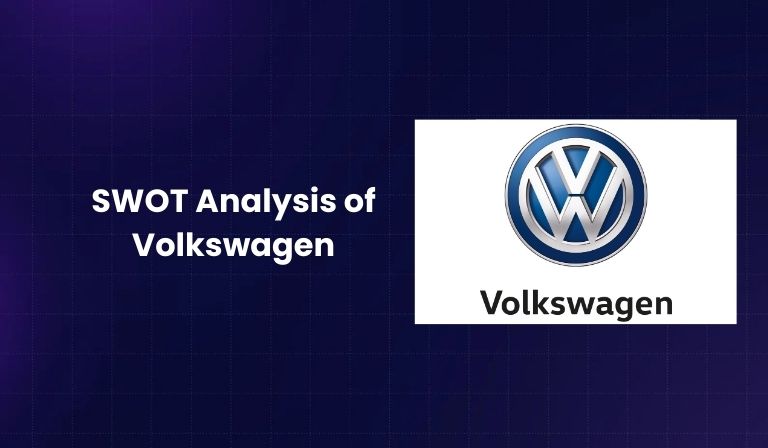Volkswagen is one of the most iconic names in the automotive industry, with a legacy that stretches back to 1937. From the legendary Beetle that became a global cultural symbol to the modern electric ID series shaping the future of sustainable mobility, Volkswagen has remained a leader in innovation, design, and performance.
In 2025, the company faces both opportunities and challenges as the automobile industry undergoes rapid transformation. This SWOT analysis of Volkswagen will break down its strengths, weaknesses, opportunities, and threats to understand how the brand positions itself in today’s dynamic global market.
Overview of Volkswagen
- Company type: Division
- Industry: Automotive
- Founded: 28 May 1937 (86 years ago)
- Founder: Robert Ley
- Headquarters: Wolfsburg, Germany
- Area served: Worldwide
- Key people: Thomas Schäfer (CEO, Volkswagen Passenger Cars)
- Parent company: Volkswagen Group
- Website: volkswagen.com
Volkswagen Group is home to some of the world’s most recognized Volkswagen luxury brands including Porsche, Bentley, Lamborghini, Audi, and Bugatti. This extensive portfolio ensures its presence across mass-market, premium, and ultra-luxury segments.
Volkswagen SWOT Analysis
The Volkswagen SWOT analysis highlights the internal factors (strengths and weaknesses) and external factors (opportunities and threats) influencing the company in 2025.
Strengths of Volkswagen
- Strong Financial Performance
Volkswagen’s robust financial position allows it to consistently invest in innovation. In 2023, it ranked 13th in sales revenue and 40th in profitability according to Forbes. Strong cash flow means Volkswagen can continue funding its ambitious electric vehicle (EV) projects and global expansions. This financial strength is crucial in an industry where billions are required for R&D and manufacturing transformation. - World-Class Employer Recognition
Volkswagen was ranked as the 41st best global employer in 2023. This recognition highlights its dedication to employee well-being, training, and creating a vibrant work culture. Attracting top engineering and design talent ensures that Volkswagen maintains its competitive edge in the evolving mobility sector. - Leading Global Manufacturer
With 9.24 million vehicle deliveries in 2023, Volkswagen is the second-largest car manufacturer globally, just behind Toyota. This scale demonstrates the brand’s ability to meet diverse consumer demands, from affordable hatchbacks to luxury SUVs and sports cars. - Global Reach and Manufacturing Base
Volkswagen sells cars in 153 countries and operates 122 manufacturing plants across 20 European nations, plus 11 more globally. Such a wide presence strengthens its resilience and makes its supply chain robust enough to serve global markets efficiently. - Strong Research and Development (R&D)
Volkswagen invested €21,779 million in R&D in 2023, one of the highest in the automotive sector. This investment covers areas like EVs, autonomous driving, and digital transformation. In the context of the SWOT analysis of electric vehicles, Volkswagen’s aggressive EV R&D ensures it remains a leader in the global transition to sustainable mobility. - Excellent Brand Recognition
The VW logo is one of the most recognized automotive symbols worldwide. It represents trust, longevity, and quality. This brand equity is a competitive advantage that helps Volkswagen maintain loyalty across generations of car buyers. - Diverse Portfolio Including Luxury Brands
The Volkswagen luxury brands portfolio includes Lamborghini, Bugatti, Bentley, Porsche, Audi, and Škoda, alongside the mass-market Volkswagen brand. This mix allows the company to target different customer segments — from budget-conscious buyers to ultra-rich consumers seeking exclusivity. - Sustainability Commitment
Through its “TOGETHER – Strategy 2025,” Volkswagen has pledged leadership in sustainable mobility. The push toward electrification, renewable energy, and eco-friendly materials aligns with regulatory and consumer demands. This proactive approach strengthens its reputation as a future-ready automaker.
Weaknesses of Volkswagen
- Emission Scandal Legacy
The 2015 Dieselgate scandal, where Volkswagen was caught cheating emissions tests, severely damaged its reputation and cost over €30 billion in fines. Despite years of recovery, this scandal still lingers as a trust issue among some consumers. - Lack of Diversification in New Mobility
Volkswagen remains heavily focused on car manufacturing. Unlike newer mobility players, it has not invested significantly in ride-sharing or subscription-based models. This limited diversification makes it less appealing to younger generations shifting away from traditional car ownership. - Weak Marketing Beyond Europe
Volkswagen’s marketing outside Europe has often been weak compared to aggressive competitors like Toyota and Hyundai. In China, for example, Volkswagen relies heavily on joint ventures like JAC, which reduces direct brand visibility. - High Branding Costs for Luxury Brands
Maintaining luxury subsidiaries like Porsche and Bentley requires significant investment in branding, advertising, and exclusivity. While profitable, these costs put pressure on group-wide resources, especially when entering new markets. - Complex Management Structure
Managing multiple brands, factories, and subsidiaries leads to bureaucracy and slow decision-making. This reduces agility in responding quickly to fast-changing automotive trends. - Dependence on Europe and China
Over 40% of Volkswagen’s sales come from Europe and China. Any economic or political instability in these regions could significantly impact the company’s overall performance. - Overreliance on Diesel Technology
For decades, Volkswagen focused heavily on diesel engines, which are now declining in demand due to environmental concerns. This transition has forced Volkswagen to quickly shift resources toward EVs. - High Dependence on Combustion Engines
Although Volkswagen is pushing into EVs, a large portion of its current revenue still comes from traditional combustion engine cars. This reliance makes it vulnerable as regulations tighten globally. - Debt Levels
The combination of Dieselgate penalties, massive R&D investments, and global operations has increased Volkswagen’s debt. High debt reduces financial flexibility in times of crisis. - Product Recalls
Frequent recalls due to technical issues have impacted Volkswagen’s brand reputation and raised questions about quality control. Recalls increase costs and reduce customer confidence.
Opportunities for Volkswagen
- Emerging Market Expansion
Markets like India, Africa, and Southeast Asia offer enormous growth potential. Rising middle-class populations and urbanization trends in these regions create new demand for affordable and mid-range cars. - Electric Vehicles (EV) Leadership
With billions invested in EV technology, Volkswagen is well-positioned to dominate this growing market. Its ID series and PowerCo battery initiative align perfectly with global demand for clean transportation. The SWOT analysis of electric vehicles highlights that consumer adoption is rising fast, making Volkswagen’s EV investments timely and strategic. - Autonomous Driving
Volkswagen is developing autonomous technologies for both passenger and commercial vehicles. If successful, this could open new revenue streams and position the brand as an innovator in future mobility. - Battery Manufacturing (PowerCo Initiative)
Volkswagen launched PowerCo to focus on battery production, ensuring control over its EV supply chain. Six European battery plants are planned by 2030, giving Volkswagen a significant edge in EV competitiveness. - Big Data and Analytics
Leveraging big data allows Volkswagen to personalize customer experiences, improve marketing campaigns, and optimize supply chains — critical for profitability and efficiency. - Digital Transformation
By investing in connected cars, digital services, and ride-sharing solutions, Volkswagen can transition toward a service-based automotive ecosystem, appealing to tech-savvy generations. - Sustainability and Green Technologies
Beyond EVs, Volkswagen is investing in recyclable materials, renewable energy for factories, and low-carbon supply chains. These steps enhance its position as an eco-conscious brand. - Strategic Partnerships
Collaborations with tech companies and startups help reduce R&D costs, accelerate innovation, and expand into new mobility areas. Partnerships in batteries and AI-driven driving solutions are especially important. - Expansion of Financial Services
Volkswagen’s financing, leasing, and fleet management services are growth opportunities, especially in markets where auto financing is new. Making ownership accessible builds loyalty and boosts sales. - After-Sales Service Growth
Enhancing after-sales services like maintenance and accessories creates recurring revenue and strengthens customer retention.
Threats to Volkswagen
- Intense Competition
The auto industry is hyper-competitive, with Toyota, Tesla, Hyundai, BMW, and Mercedes-Benz vying for market share. New EV players and tech giants are further intensifying the race. - Failure to Engage Younger Consumers
Millennials and Gen Z often prioritize mobility solutions over car ownership. If Volkswagen doesn’t adapt, it risks being perceived as outdated. - Regulatory Challenges
Constantly evolving emission and safety laws increase compliance costs. Stricter EV mandates in Europe, the US, and China force rapid product adaptation. - Economic Dependence on Europe and China
Economic instability in these two regions could significantly affect Volkswagen’s revenues, given its reliance on them. - Technological Disruption
EVs, self-driving cars, and shared mobility are transforming the industry. Falling behind in these areas would put Volkswagen at a disadvantage. - Supply Chain Disruptions
Global tensions, semiconductor shortages, and trade wars have already affected automotive supply chains. Volkswagen’s complex network increases its exposure to these risks. - Environmental Pressure
With climate change and public demand for sustainable solutions rising, Volkswagen must accelerate its green transformation to remain relevant. - Reputation Risks
Past scandals like Dieselgate remain in public memory. Any new ethical or technical misstep could significantly harm the brand. - Cybersecurity Risks
As vehicles become more connected, they also become more vulnerable to hacking and data breaches. Cybersecurity investments are now essential to maintain consumer trust.
Conclusion
The SWOT analysis of Volkswagen shows a company balancing a prestigious legacy with ambitious innovation. Its financial strength, global presence, and diverse portfolio — including strong Volkswagen luxury brands like Audi, Porsche, and Bentley — position it as a powerhouse in the industry.
However, challenges like emission scandal legacy, dependence on combustion engines, and high debt levels cannot be ignored. The opportunities in electric vehicles, autonomous driving, and digital services are immense, but threats from fierce competition and regulatory shifts require constant adaptation.
By leveraging its R&D power, sustainability initiatives, and global reach, Volkswagen can continue to shape the future of mobility while overcoming its historical weaknesses.
FAQs
What is Volkswagen best known for?
Volkswagen is known for iconic cars like the Beetle, its massive global manufacturing presence, and its portfolio of Volkswagen luxury brands including Porsche, Audi, and Bentley.
What are Volkswagen’s main weaknesses?
Key weaknesses include the lasting impact of the Dieselgate scandal, reliance on combustion engines, high debt levels, and frequent product recalls.
What opportunities does Volkswagen have in 2025?
Volkswagen can expand into emerging markets, strengthen its EV leadership through the ID series and PowerCo battery initiative, and invest in autonomous driving technologies.
How does Volkswagen perform in the electric vehicle market?
Volkswagen is aggressively investing in EVs and battery manufacturing. In the SWOT analysis of electric vehicles, Volkswagen emerges as a strong contender due to its scale, technology, and infrastructure investments.
What threats does Volkswagen face today?
The biggest threats include intense competition, regulatory changes, supply chain disruptions, cybersecurity risks, and reputation damage from past scandals.
A digital marketer with a strong focus on SEO, content creation, and AI tools. Creates helpful, easy-to-understand content that connects with readers and ranks well on search engines. Loves using smart tools to save time, improve content quality, and grow online reach.

